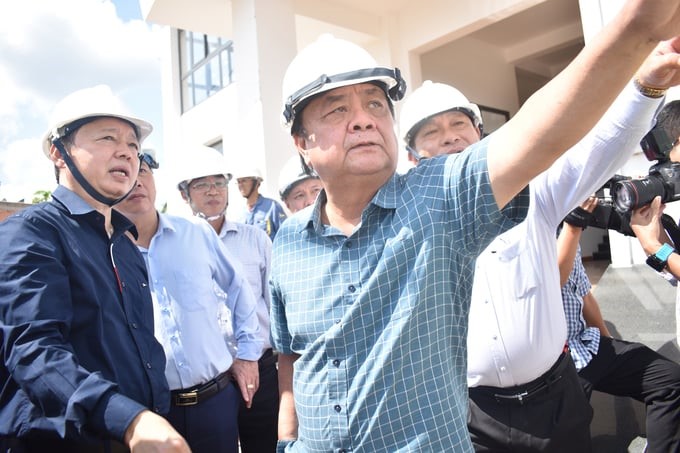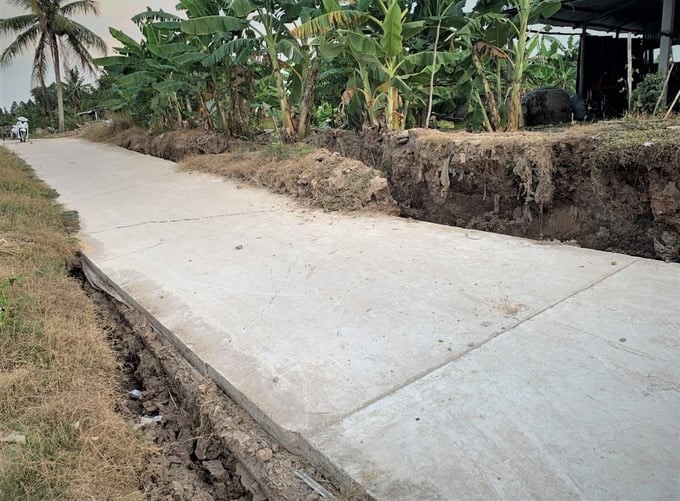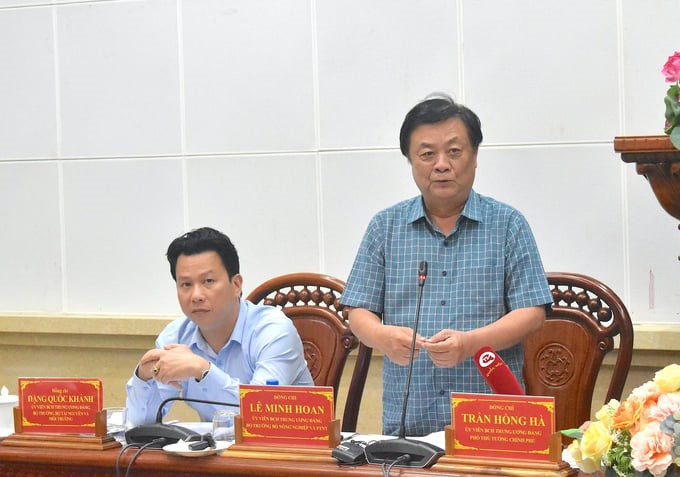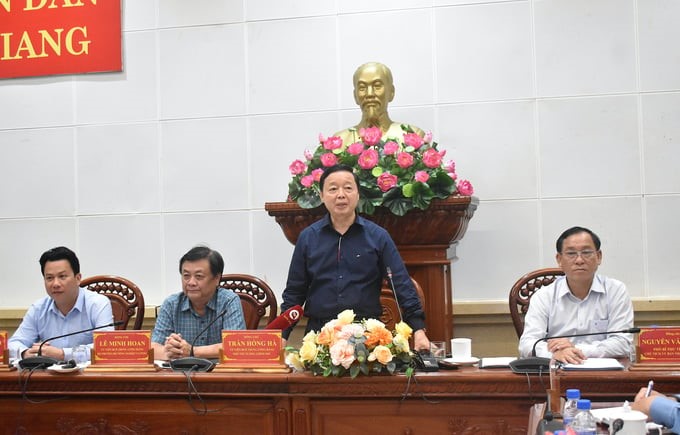November 25, 2025 | 17:18 GMT +7
November 25, 2025 | 17:18 GMT +7
Hotline: 0913.378.918
November 25, 2025 | 17:18 GMT +7
Hotline: 0913.378.918
Implementing the Prime Minister's direction, on April 7, in Tien Giang province, Deputy Prime Minister Tran Hong Ha, along with Minister of Agriculture and Rural Development Le Minh Hoan and Minister of Natural Resources and Environment Dang Quoc Khanh, chaired an online meeting with eight coastal provinces in the Mekong Delta on this work.
Deputy Prime Minister Tran Hong Ha said that in recent times, news agencies have paid great attention and responsibility to reflect the problem of drought and salinity in the Mekong Delta, especially the impact of drought and salinity on people's lives. In Tien Giang province, local leaders are very proactive, with the spirit of announcing situations and informing forecasts and solutions early and remotely.

The delegation inspected the construction progress of the Nguyen Tan Thanh sewer in Tien Giang province. Photo: Minh Dam.
Through inspecting and recording the actual opinions of people in some areas, especially disadvantaged areas and areas completely living in salinity conditions in Tien Giang province, the Deputy Prime Minister assessed that the water supply for people is being maintained well; water shortages only occur at certain times and are localized in some areas.
Regarding state water supply systems, or public-private systems, Tien Giang province has arranged a centralized water supply system as well as implemented many solutions to mobilize forces to bring water to the elderly's homes.
Mr. Nguyen Van Vinh, Chairman of the Tien Giang Provincial People's Committee, said that currently, the province's area directly affected by drought and salinity is located in the South of National Highway 1A, with an area of about more than 36,000 ha. Therefore, in addition to the six sewers on Provincial Road 864 that have been invested in and the Nguyen Tan Thanh sewer that is about to be completed, the province also proposed that the Ministry of Agriculture and Rural Development pay attention to investing in the construction of three more sewers, Tra Tan, Ba Rai, and Phu An, with a budget of about VND 887 billion. This aims to close the Bao Dinh project area, thereby expanding the protected area to about 130,000 ha.
At the same time, the province proposed that the central government upgrade and expand the 10-hectare Phu Thanh and 6-hectare Tan Thoi water storage ponds to serve people in Tan Phu Dong district. Upgrade and expand Gia Thuan Pond (10 ha), Binh Thanh Pond (30 ha), and Go Dua Pond (15ha), with an estimated cost of about VND 300 billion, to serve people in Go Cong Dong, Go Cong Tay, and Go Cong town.

At the construction site, the Deputy Prime Minister emphasized that in recent times, the Government has invested in many irrigation structures to help the Mekong Delta proactively cope with drought and salinity, which has been effective, especially in this dry season. Photo: Minh Dam.
For Soc Trang province, Mr. Tran Van Lau, Chairman of the Soc Trang Provincial People's Committee, proposed that the Government and Ministry of Agriculture and Rural Development invest in some more irrigation structures. Specifically, seven sewers on the Southern Hau River national highway are in need of new construction. Besides, 14 sewers on the Phung Hiep Highway also need to be built to protect over 100,000 hectares of low-lying production land.
In Ca Mau and Kien Giang, the main effects of drought and salinity are subsidence and landslides. In Kien Giang, the main damage caused by drought is subsidence and landslides, which cause serious damage to traffic routes in the buffer zone of U Minh Thuong National Park, U Minh Thuong district.
As of now, there have been 323 landslide and subsidence points of land and rural traffic routes with a total length of more than 8.7 km that have collapsed 26 people's houses along canals, resulting in an estimated total loss of more than VND 88.6 billion. If the drought continues for long, the number of landslides will increase. The district has counted a total of 434 houses built along the canal, of which 54 are at high risk of further collapse. The local government is conducting dissemination, advocacy, and support for people to relocate.

Traffic landslide in the U Minh Thuong area, Kien Giang province. Photo: Trung Chanh.
However, according to Mr. Le Quoc Anh, Vice Chairman of the Kien Giang Provincial People's Committee, thanks to the investment in the irrigation system, especially the Cai Lon-Cai Be project cluster, and the effective operation of the projects, damages have been reduced.
Leaders of the Ministry of Agriculture and Rural Development (MARD) and the Ministry of Natural Resources and Environment (MONRE) shared the difficulties that the Mekong Delta region is facing due to drought and salinity caused by reduced upstream water levels, hot weather, and the completely deformed flow of the Mekong River.
In the coming time, in addition to continuing to implement structural and non-structural solutions, localities in the region need to promote dissemination to raise awareness among each household to participate in preventing and controlling drought and salinity and living with climate change; strengthen water storage in each household; and have solutions to save water resources.
At the same time, it is necessary to link water resources and farming and re-plan the population in living and production spaces to adapt to climate change. MONRE alone will perfect the national data project and strengthen forecasting and prediction to help the government and people of the Mekong Delta region prevent and control natural disasters.

Minister of Agriculture and Rural Development Le Minh Hoan said that there must be a more overall strategy for the drought and salinity story of the Mekong Delta. Photo: Minh Dam.
Minister of Agriculture and Rural Development Le Minh Hoan said that there must be a more overall strategy for the drought and salinity story of the Mekong Delta. According to the Minister, the story of the Mekong Delta is the story of agriculture. There needs to be coordinated research between the cultivation and irrigation sectors for proactive adaptation. As in cultivation, it is necessary to re-plan the crop.
"Regarding damage to rice in the Mekong Delta, during the recent drought session, there was no damage in the areas sowing seeds according to the direction of the agricultural sector. Whereas, the places where people self-sow seeds when seeing the price of rice rising or where the agriculture sector does not advise will suffer damage. This is evidence showing the close linkage between irrigation and cultivation," the Minister emphasized. Therefore, MARD will also recommend managing freshwater and saltwater regulation sewers systematically, inter-regionally, and regionally, not locally.
In particular, the Minister also said that it is necessary to promote communication to raise public awareness about climate change adaptation. MARD is also building a clean water supply project for 30,000 households in disadvantaged areas in the Mekong Delta provinces, especially coastal provinces, related to drought and salinity.

Deputy Prime Minister Tran Hong Ha spoke at the conclusion of the conference. Photo: Minh Dam.
Speaking at the conclusion of the working session with localities in the Mekong Delta, Deputy Prime Minister Tran Hong Ha acknowledged and highly appreciated the efforts of the provinces in the region to proactively implement effective solutions to cope with drought and salinity, so this time is not as harsh as the 2019–2020 period and has not caused any serious damage to production or business. Although there is local water scarcity, local governments have had synchronous and timely plans to help people reduce difficulties during the dry season.
Deputy Prime Minister Tran Hong Ha noted that localities in the Mekong Delta need to draw lessons in preventing and cotrolling drought and salinity; reassess groundwater sources; and have proactive solutions for living with drought and salinity in each area, closing the irrigation system, and implementing the Law on Water Resources that is about to take effect.
The Mekong Delta still faces three sessions of drought and salinity
Mr. Hoang Duc Cuong, Deputy Director General of the Viet Nam Meteorological and Hydrological Administration, Ministry of Natural Resources and Environment, said that in the coming time, it is forecast that the El Nino phenomenon will move to Lanina. However, the impact of El Nino is still present but does not prolong. Specifically, the hot weather is forecast to last until about April 20, or over 10 more days.
From April 20 onwards, there will be unseasonal but non-continuous rains, only solving the problem of heat and providing an insignificant amount of water that only eases the stress of the current situation. This year's rainy season comes about 10-15 days late compared to other years, so from May 10-15, longer rains begin, and then the drought situation is overcome, and around May 20 onwards, the rainy season officially begins in the South.
From now until the end of the dry season, the Mekong Delta still has to face three more sessions of saltwater intrusion. Specifically, session 1 is from April 8–13, phase 2 is from April 22–28, and phase 3 is from May 7–11. The salinity level is 4‰. On the Vam Co Dong and Vam Co Tay rivers, the intrusion is from 70–95 km; Cua Tieu and Cua Dai rivers from 50–62 km; Ham Luong river from 60–68 km; Co Chien river from 45–55 km; Hau River from 40–45 km; and Cai Lon river from 45–50 km.
Translated by Huyen Vu Thu

(VAN) Deputy Minister Nguyen Quoc Tri emphasized the determination to prevent violations at CoP20, sharing enforcement results and commitments to strengthen cooperation with the international community in the coming period.

(VAN) In addition to strengthening the relationship between schools and enterprises, the Aus4Skills project expands opportunities for female students and people with disabilities to work in the transport and logistics sector.

(VAN) Nghe An is preparing policy, technical, and resource steps to participate in the forest carbon credit market.
/2025/11/25/1648-2-110733_532.jpg)
(VAN) From 2011 to 2023, Ca Mau province lost approximately 6,200 ha of coastal land and protection forests due to erosion, threatening many residential areas, infrastructure facilities, and production zones.

(VAN) Quang Ngai holds strong potential for carbon credits but needs a clear legal and policy framework to secure sustainable revenue from this resource.

(VAN) With its diverse ecosystem, Phu Quoc National Park plays a vital role in environmental protection and biodiversity conservation and serves as the core zone of the Kien Giang World Biosphere Reserve.

(VAN) Cooperation activities under the Aus4Skills program focus on: logistics professional development, competency-based training and assessment (CBTA), leadership innovation, and digitalization.